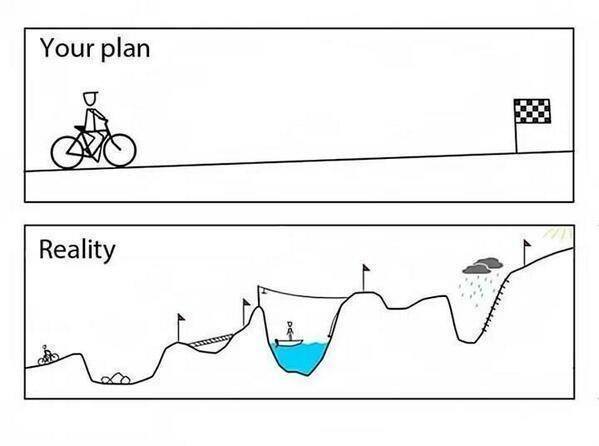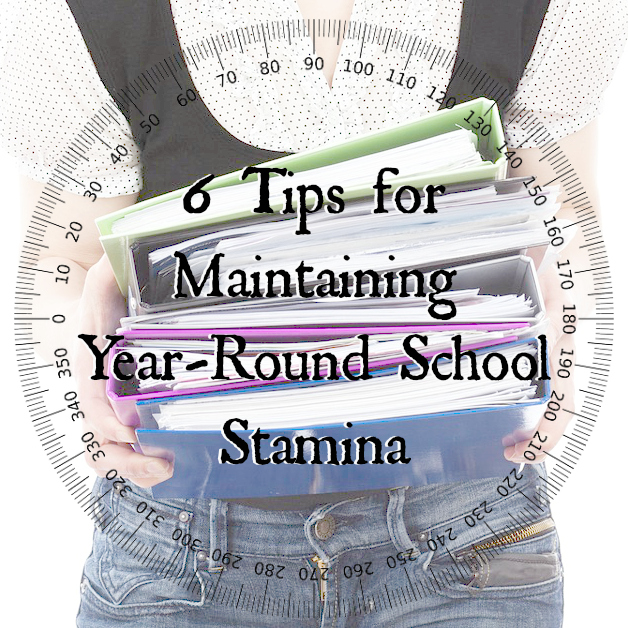It is warm and sunny outside, yet all of my kids are diligently hunched over their pencils and math books right now. For over 6 years (wow, time flies) my crew has been homeschooling year round. It is a system that works fantastically well for us, but I get a constant stream of questions from friends. “Why do school in the summer when you don’t have to?” “When do you plan?” “Don’t you ever need a break?”
Although our schedule is different from the traditional school calendar, we really do take breaks. We enjoy vacations and long weekends whenever we want, and I much prefer continual advancement to re-teaching after long breaks.
So, how do we do it without burnout?
1. Embrace Cycles and Routines
Our school year is divided into two distinct halves. October through March is our history focus, with all of our energy devoted to fun reenactments, field trips and crafts. April through September, on the other hand, is science focused, where we spend long hours hypothesizing, building, experimenting. This cycle gives the kids something to look forward to. It also grants me a break from the most labor intensive subjects regularly, allowing me to plan intensive projects like building our physics playground.
Your own cycles may revolve around a co-op that you attend, a sports travel schedule, or anything else that routinely affects your school for large chunks of time. It doesn’t need to look like mine, but make sure that you plan for include a variety of activities and give yourself some changes to regularly look forward to.
2. Plan Continually
During the off cycles I have the time to research and plan for our next rotation. I usually do most of that work during our scheduled days/weeks off. So how do I find those days?
To be honest, I usually start planning by inviting a few friends over. I know that sounds counter-intuitive, but it gives me the opportunity to send the kids outside for hours while I curl up in a cozy chair, with 1. a year-long calendar, 2. a blank notebook, 3. any materials I plan to use and 4. my computer. I like the simplicity of these free ones from Donna Young for sketching ideas, but I later transfer my final plans to google calendar.
The first step is to get everything out of your head. I like to start with crossing off any days that I know we won’t be doing school: holidays, vacations, doctor’s appointments, etc. Then I add in any extra curricular activities like our co-op schedule, 4-H calendar, or seasonal bible studies. Finally, I look through our materials and jot down notes about what should fit where. This gives me a great overview of what our schedule will be.
Having this year-long overview makes it easy to search for when I think I will need a break. Eight weeks of continuous school is usually my happy point, although I know a lot of people prefer to have six or 10 week terms. Simply experiment and find what works for you. Knowing when the next scheduled break is coming means that down-time is always near. If you don’t plan out your calendar, you could easily feel like you are drowning.
This is an organic process. During each of our breaks I re-evaluate and adjust as needed. Which leads us to tip #3.
3. Know what your Interruptions Are
Consistency is important, but that doesn’t mean that every day has to look exactly the same. Obviously, there will be times when you suddenly need to visit the hospital daily for an unexpected emergency or you need to shift things around to include a new opportunity. Don’t let new interruptions a become stumbling blocks to your routine, instead simply admit that the schedule you started with needs to be re-worked. Intentionally sit down with your calendar to figure out how you can adjust around it.
Not every subject needs equal attention for each child. Figure out which subjects are must-do on a daily basis, and which can be concentrated on the days that you have more “free” time. (seriously, why we call it free time baffles me) Language Arts and Math are something that we work on constantly, but when those interruptions come, I can easily push geography to another time, or use one of our off weeks to spend concentrated time on just that one subject. Because our school year is longer, I feel as if I have the freedom to stop and review or re-teach whenever we hit a snag, then pick up where we left off and still finish each level in a timely manner.

Personally, admitting that I wasn’t doing a good job of teaching school on weekdays with Dad at home was a bitter pill for me to swallow, but once I simply started scratching those days off our schedule our entire year ran much smoother. Dad’s weekdays off aren’t an interruption, they are an opportunity.
4. Schedule Refreshing Retreats
Every 8 weeks I need to take a day away from the daily grind. My favorite way to reset is to download a few new podcasts to my phone and listen as I drive the kids to a friend’s house, or while I sit and watch them at the beach. These aren’t days for major educational field trips, but days to sit and intentionally regroup. That few hours of inspiration and variety gives me a huge emotional boost.
During my regular retreats I make a list of library materials to pick up for our next term, update my iPod with memory songs, and make note of all of the (supposedly “household” but never available in my house) materials that we will need for experiments and crafts. I also intentionally check over my calendar to make sure that we are on track. That doesn’t mean that I force our learning to fit the schedule I made in the beginning of the year – quite the opposite, I look to see if my kids are struggling and need additional instruction added to the master plan, or if they are able to jump tot he next level without unnecessary drill.
5. Anticipate Bad Days
My mom used to call these “mental health days.” They are tiny doses of peace taken at the exact moment when you need them. Know when your endurance is being stretched to its breaking point and give yourself the freedom to step away when necessary.
Not feeling guilty about taking time for yourself is tricky for anyone who works from home. As moms we tend to feel even more guilty. We are needed every day in our Mommy role, but we don’t always have to be teacher. It is okay to step back and take some time to recharge (or catch up on the laundry). Use those days off to simply be. You don’t need to plan, or schedule, think or do anything for school. Just take a day off.
Leave a buffer in your calendar of at least one day per term. Use this as your failsafe. Knowing that you have that day in reserve makes you feel free to take the time you need, without guilt. However, be conscious that you don’t go over your allotted days off or it will bite you at the end of the year. That long calendar yawning in front of you may look as if you will have plenty of time to take extra days now, but momentum is important. Be wise with your time, and if you realize that you have gotten off track, sit back down with that calendar and re-adjust to make sure that you are being responsible.
6. Maintain Your Space
With year round schooling, it would be easy to let our school calendar take over our entire schedule. As strange as it sounds, that would be disastrous to our schooling. When our space gets cluttered, our minds feels cluttered. Taking time to re-organize books or plan meals is important for my family’s sanity.
To prevent the school clutter from taking over, we intentionally set aside time to take care of home tasks. Once a term during our scheduled break my crew devotes an entire day to listening to a great audio-book while fixing up our space. I also take an embarrisngly long trip to BJs, the grocery store, and the office supply store and stock up on anything we need. Having freezer meals ready to go and knowing that we have a day set aside to wash those filthy windows gives me the ability to fully focus on school when I need to.
Learning year round doesn’t prevent us from doing fun stuff during the summer. Instead, it gives us the freedom to grab fun opportunities all the time, to adjust when needed, and to take time for refreshment whenever we need it. I love this lifestyle.


